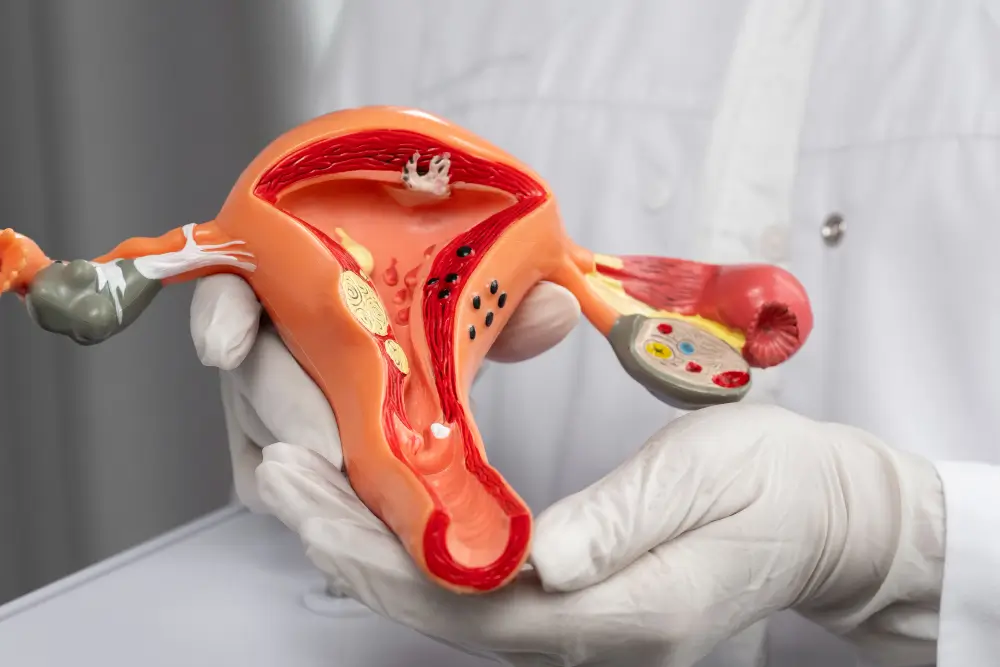
To the majority, it is an invisible or bulletless war between the body’s conception and defense mechanism. Among its lesser-known reasons for infertility are cervical hostility or a hostile uterus, in which uterine or cervical culture is one that poisons the sperm, prevents it from passing through to the egg, or poisons an implanting embryo.
This scholarly paper explains what is a hostile uterus, how it impacts fertility, and how women can cure themselves of this disabling disease.
What is a Hostile Uterus?
Hostile uterus refers to the cervical or uterine environment that is not hospitable to the sperm or embryonal development. Ideally is when the cervix is stimulated to secrete fertile cervical mucus that is an open channel for sperm to move through into the fallopian tubes. With thinned mucus, too acidic, or immunized with antibodies, they destroy sperm before it even comes close to the egg.
In all of them, the uterus itself will be hostile after it realizes that the sperm or the embryos are an invasion of the body. It is also known as hostile uterine or cervical hostility. It may result in inhibition of fertilization or spontaneous abortion of an embryo and render fertility impossible.
Signs and Symptoms of a Hostile Uterus
Symptoms of a hostile uterus are so mild that even may never surface until conception problems occur. Most common symptoms are:
- Painful intercourse or post-ovulation
- Intelligent secretions or thickening of cervical mucus
- Intelligent menstrual cycles
- Failed many IVF attempts at implantation
- Cannot diagnose infertility on a standard exam
All the signs of a hostile uterus are infuriating and emotionally draining to the couples who are unable to conceive after a very long, long time.
Can a Hostile Uterus Cause Miscarriage?
Yes, there are times when the hostile uterus can cause miscarriage. If the uterus is only exposed to the embryo as a foreign body, then the immune system develops an inflammatory response. What it does is that the embryo will inappropriately implant or induce preterm miscarriage, even before pregnancy can be identified through the pregnancy test.
Women who experience recurrent early pregnancy loss are unconscious victims of hostile uterus miscarriage, in which the uterine lining ejects the implanting embryo.
Can You Get Pregnant with a Hostile Uterus?
Do women ever ask themselves, Can you get pregnant with a hostile uterus? Yes — but maybe with a pill. Although an hostile uterus does cause women not to become pregnant naturally, advances in reproductive medicine today allow women to get pregnant.
Treatment is through a hostile uterus at an early stage, and appropriate treatment. The instant your physician identifies the cause of hostility — hormonal disorder, immune response, or cervical factor — your physician can then offer proper treatment to allow fertility success.
Hostile Uterus Diagnosis
A hostile uterus diagnosis is primarily made through a combination of physical examination and tests in the laboratory. Your fertility expert will most likely prescribe:
- Postcoital Test (PCT): Coital test of sperm resistance to cervical mucus.
- Hormonal Testing: Hormonally tested for excess estrogen or progesterone deficiency.
- Immunological Testing: To check if antibodies against the sperm or embryos are present.
- Recommended Ultrasound and Hysteroscopy: To reveal structural abnormalities or uterine infection.
All these tests reveal whether the defect lies in the cervix, uterus, or immune system.
Hostile Uterus Treatment Options
If you’re wondering how to treat a hostile uterus, several effective medical and lifestyle approaches can help:
Hormonal Therapy
- Balances estrogen and progesterone levels.
- Helps regulate cervical mucus production and uterine lining health.
Antibiotic or Anti-Inflammatory Medication
- Reduces inflammation or infection that might trigger hostility.
Intrauterine Insemination (IUI)
- Avoids the cervix by introducing sperm into the uterus, bypassing hostile mucus.
In Vitro Fertilization (IVF)
- Fertilizes egg outside the body and implants embryo in the lab into the uterus.
Steroid Therapy or Immunotherapy
- Represses immune reactions against sperm or embryos.
Lifestyle Modifications
- Stress reduction through diet, healthy nutrition, and toxin elimination may potentially render the uterus more receptive.
Following effective hostile uterus treatment, most women proceed to carry a successful pregnancy to term.
Hostile Uterus During Pregnancy
Invasive uterine pregnancy may, in others, also manifest as secondary complications secondary to placental perfusion compromise or inflammation. Your pregnancy can accommodate a normal course with observation, medication you will receive, and supportive treatment.
If you have a miscarriage or recurrent unsuccessful IVF, you should be evaluated by a reproductive endocrinologist who will individualize your care to your situation.
In Surrogacy4All, our physicians treat the patient and diagnose and treat the etiology of complex infertility, such as hostile uterus and cervix hostility.
Emotional Impact and Support
Treatment of infertility issues, such as a hostile uterus, is a terrifying emotional experience. Frustration, helplessness, and guilt are to be expected. Counseling, therapy, and support groups can be of great assistance to help the couple cope with this frustrating experience.
Don’t fret, infertility isn’t your doing — and technology has never been more astute.
Frequently Asked Questions (FAQs)
Q1. What is a hostile uterus?
Ans : A hostile uterus is a cervical or uterine environment that is inimical to the health of sperm or to implantation of the embryo, typically due to hormonal or immunological issues.
Q2. Can a hostile uterus cause miscarriage?
Ans : Yes. The uterus may reject the embryo as a foreign body immune reaction and leading to repeated or early miscarriages.
Q3. Can you get pregnant with a hostile uterus?
Ans : Yes, but after medical intervention like IUI, IVF, or hormone therapy, which changes the unfriendly state.
Q4. What are the common symptoms of a hostile uterus?
Ans : Thick cervical mucus, abnormal menstrual discharge, implantation failure, or idiopathic infertility.
Q5. How do doctors diagnose a hostile uterus?
Ans : Postcoital test, hormone testing, immune testing, and imaging such as ultrasounds or hysteroscopy.
Q6. How to treat a hostile uterus?
Ans : With hormones, antibiotics, immune therapies, or assisted reproductive technologies such as IVF.
Q7. Is a hostile uterus during pregnancy dangerous?
Ans : Not always, but it will have to be closely monitored by physicians to provide maximum embryo growth and uterine health.
Final Words
An unfriendly uterus is not the end of fertility life as a woman — it’s merely an indication that your body will require some doctor assistance to become pregnant. Accurate diagnosis, care in progress, and counseling may be the turner.
With fertility experts as qualified as Surrogacy4All, hundreds of thousands of women who have been diagnosed with a hostile cervix or uterus have become healthy mothers with issue-free pregnancies.
If you are aware you have this disease, wait no longer. Reach out today at (212) 661-7673 and begin to experience hope and healing.

Rashmi Gulati
Rashmi Gulati, MD, provides innovative, individualized health care that nurtures mind, body, and spirit. Since 2004 she has been the medical director at Patients Medical, where she delivers comprehensive personalized health care, treating each patient as a respected, unique individual. Through their integrative health care center in the heart of Manhattan, Dr. Gulati and her colleagues have become premier care providers serving patients locally and throughout the world.






